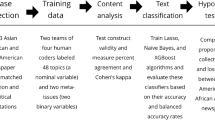Abstract
Advances in machine learning and natural language processing are revolutionizing the way we live, work, and think. As for any science, they are based on assumptions about what the world is, and how humans interact with it. In this paper, I discuss what is potentially one of these assumptions: structuralism, which states that all cultures share a hidden structure. I illustrate this assumption with political footprints: a machine-learning technique using pre-trained word vectors for political discourse analysis. I introduce some of the benefits and limitations of structuralism when applied to machine learning, and the risks of exploiting a technology before establishing the validity of all its hypotheses. I consider how machine-learning techniques could evolve towards hybrid structuralism or post-structuralism, and how deeply these developments would impact cultural studies.




Similar content being viewed by others
References
Abdulkader A, Lakshmiratan A, Zhang J (2016) Introducing DeepText: Facebook’s text understanding engine. Facebook code. https://code.facebook.com/posts/181565595577955/introducing-deeptext-facebook-s-text-understanding-engine/
Bachelard G (1986) The new scientific spirit. Beacon Press, Boston
Barthes R (1972) Mythologies. Hill and Wang, New York
Bojanowski P, Grave E, Joulin A, Mikolov T (2016) Enriching word vectors with subword information. https://github.com/facebookresearch/fastText
Bremmer I (2016) These 5 facts explain Donald Trump and Hillary Clinton’s Foreign policy debate. Time. http://time.com/4510023/hillary-clinton-donald-trump-foreign-policy-debate/
Chah N (n.d.) https://github.com/nchah/word2vec4everything
Chomsky N (1965) Aspects of the Theory of Syntax. MIT Press, Cambridge
Clark J (2015) Google turning its lucrative web search over to AI machines. Bloomberg. https://www.bloomberg.com/news/articles/2015-10-26/google-turning-its-lucrative-web-search-over-to-ai-machines
Deeplearning4j (consulted in 2017) Thought vectors, deep learning & the future of AI. https://deeplearning4j.org/thoughtvectors
Devlin H (2015) Google a step closer to developing machines with human-like intelligence. Guardian. https://www.theguardian.com/science/2015/may/21/google-a-step-closer-to-developing-machines-with-human-like-intelligence
Flores R (2016) Where does Hillary Clinton stand? CBS news. http://www.cbsnews.com/media/where-does-hillary-clinton-stand/4/
Gandel S (2016) Clinton-Trump debate: Where the candidates stand on 3 key economic topics. Fortune. http://fortune.com/2016/09/26/presidential-debate-economic-issues/
Grassegger H, Krogerus M (2017) The data that turned the world upside down. https://motherboard.vice.com/en_us/article/how-our-likes-helped-trump-win
Heuer H (2015) Text comparison using word vector representations and dimensionality reduction. https://arxiv.org/abs/1607.00534
Ibm watson natural language understanding (2017). https://www.ibm.com/watson/developercloud/natural-language-understanding.html
In encyclopædia britannica (1998) http://www.britannica.com/science/structuralism-anthropology
Lévi-Strauss C (1955) Tristes tropiques. Penguin Books, London
Mikolov T, Chen K, Corrado G, Dean J (2013) Efficient estimation of word representations in vector space. https://code.google.com/archive/p/word2vec/
Newcomb A (2016) Facebook’s artificial intelligence understands you. ABC News. http://abcnews.go.com/Technology/facebooks-artificial-intelligence-understands/story?id=39554515
Pennington J, Socher R, Manning C (2014) Glove: global vectors for word representation. https://nlp.stanford.edu/pubs/glove.pdf
Powell V, Lehe L (2017) Principal component analysis. http://setosa.io/ev/principal-component-analysis/
SAS (2017) Machine learning: What it is and why it matters. https://www.sas.com/en_ca/insights/analytics/machine-learning.html
Tensorflow word2vec (2017) https://www.tensorflow.org/tutorials/word2vec
The Associated Press (2016) Hillary Clinton is pledging more tax relief for families with young kids. Fortune. http://fortune.com/2016/10/11/hillary-clinton-tax-families/
Taeihagh A (n.d.) Assistant professor of public policy, singapore management university (smu), form. oxford and unsw. https://scholar.google.ca/citations?user=Bwt1iRUAAAAJ&hl=en
Acknowledgement
I would like to thank Niel Chah (Chah, n.d.) for his support during the political footprint development process, Araz Taeihagh (Taeihagh, n.d.) and the reviewers from AI and Society for their constructive feedback.
Author information
Authors and Affiliations
Corresponding author
Rights and permissions
About this article
Cite this article
Bruchansky, C. Machine learning: A structuralist discipline?. AI & Soc 34, 931–938 (2019). https://doi.org/10.1007/s00146-017-0764-x
Received:
Accepted:
Published:
Issue Date:
DOI: https://doi.org/10.1007/s00146-017-0764-x




